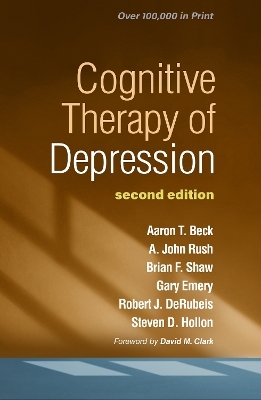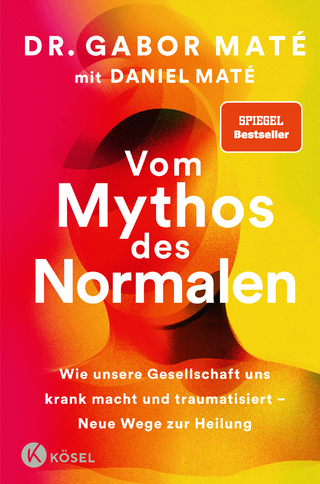
Cognitive Therapy of Depression, Second Edition
Guilford Press (Verlag)
978-1-4625-5448-5 (ISBN)
New to This Edition
*Reflects the maturation of CT for treating more complicated presentations, including patients with chronic depression or underlying personality disorders.
*Brings therapists up to date on schema-focused approaches as well as classic cognitive and behavioral interventions.
*Incorporates data from basic research and many dozens of clinical trials.
*All-new vignettes and a chapter-length case example.
*Greater attention to the therapeutic relationship and to longer-term treatment.
Aaron T. Beck, MD, until his death in 2021, was Professor Emeritus of Psychiatry at the University of Pennsylvania and President Emeritus of the Beck Institute for Cognitive Behavior Therapy. Internationally recognized as the founder of cognitive therapy, Dr. Beck has been credited with shaping the face of American psychiatry and was cited by American Psychologist as “one of the five most influential psychotherapists of all time.” Dr. Beck was the recipient of awards including the Lasker–DeBakey Clinical Medical Research Award, the Lifetime Achievement Award from the American Psychological Association, the Distinguished Service Award from the American Psychiatric Association, the James McKeen Cattell Fellow Award in Applied Psychology from the Association for Psychological Science, and the Sarnat International Prize in Mental Health and Gustav O. Lienhard Award from the Institute of Medicine. He authored or edited numerous books for professionals and the general public. A. John Rush, MD, ABPN, is Professor Emeritus at Duke–National University of Singapore and Adjunct Professor of Psychiatry and Behavioral Sciences at Duke University. A former Associate Editor of both the American Journal of Psychiatry and Biological Psychiatry, he has received Lifetime Research Awards from the American Psychiatric Association, the American College of Psychiatrists, the Society of Biological Psychiatry, the American Society of Clinical Psychopharmacology, and the National Alliance on Mental Illness. Dr. Rush’s research has focused on diagnosing, treating, and clinically managing depressive and bipolar disorders. He helped to develop cognitive therapy for bipolar disorder and adolescent depression. His work has led to the development, evaluation, and implementation of measurement-based care; clinical practice guidelines; and the recognition and management of difficult-to-treat depressions. Brian F. Shaw, PhD, is CEO of Continicare Corporation, a digital therapeutics company that provides mental health assessments and cognitive-behavioral therapy interventions. After retiring from the University of Toronto as Professor of Psychiatry and Public Health, he pursued his passion for sports psychology, including working with the championship-winning Toronto Raptors basketball team. He has been involved with providing mental health player assistance for the National Hockey League, Major League Soccer, National Women’s Soccer League, and professional gamers. He received the Keith McCreary 7th Man Award from the National Hockey League Alumni. A Fellow of the Canadian Psychological Association, Dr. Shaw has conducted research on cognitive factors as a risk for depressive and anxiety disorders and on therapist competency and treatment outcomes in cognitive therapy. Gary Emery, PhD, is a clinical psychologist with over 50 years in professional practice. One of the original authors of the cognitive therapy treatment manual for depression, he also collaborated with Aaron T. Beck on the first major cognitive therapy treatment manual for anxiety disorders. After spending a decade at the Center for Cognitive Therapy in Philadelphia, Dr. Emery moved to Los Angeles, where he broke new ground in the treatment of depression in older adults and was one of the early pioneers of telemental health. Robert J. DeRubeis, PhD, is Professor of Psychology at the University of Pennsylvania, where he has served as Director of Clinical Training, Department Chair, and Associate Dean. Dr. DeRubeis is a recipient of the James McKeen Cattell Fellow Award in Applied Psychology from the Association for Psychological Science and the Senior Distinguished Research Career Award from the Society for Psychotherapy Research. His research focuses on the processes that cause and maintain disorders of mood, as well as the treatment processes that reduce and prevent the return of symptoms. His trials comparing cognitive therapy to medications for severe depression have been published in the American Journal of Psychiatry and the Archives of General Psychiatry, and JAMA Psychiatry. Steven D. Hollon, PhD, is the Gertrude Conaway Vanderbilt Professor of Psychology at Vanderbilt University. A former editor of the journal Cognitive Therapy and Research and past president of the Association for Behavioral and Cognitive Therapies and the Society for a Science of Clinical Psychology, he received the Distinguished Scientific Award for the Applications of Psychology from the American Psychological Association and the Klerman Senior Investigator Award from the Depression and Bipolar Support Alliance. Dr. Hollon’s work has focused on the treatment and prevention of depression and has shown cognitive therapy to be as efficacious as antidepressant medications in the acute treatment of severe depression, with more enduring effects.
Foreword, David M. Clark
Preface
1. Overview
2. The Role of Emotion and the Nature of the Therapeutic Relationship
3. Structure of the Therapeutic Interview
4. The Initial Session: Providing a Cognitive Rationale
5. Application of Behavioral Techniques
6. Cognitive Techniques
7. Schemas: Core Beliefs and Underlying Assumptions
8. Addressing Comorbid Disorders
9. Treating the Suicidal Patient
10. Integration of Homework into Therapy
11. Termination and Relapse Prevention
12. Modifications for Different Settings and Populations
13. Common Problems Encountered in Cognitive Therapy
14. Extended Case Example
15. Cognitive Therapy and Antidepressant Medications
16. Outcome Studies of Cognitive Therapy
References
Index
| Erscheinungsdatum | 04.07.2024 |
|---|---|
| Verlagsort | New York |
| Sprache | englisch |
| Maße | 152 x 229 mm |
| Gewicht | 760 g |
| Themenwelt | Geisteswissenschaften ► Psychologie ► Persönlichkeitsstörungen |
| Medizin / Pharmazie ► Medizinische Fachgebiete ► Psychiatrie / Psychotherapie | |
| Sozialwissenschaften ► Pädagogik ► Sozialpädagogik | |
| Sozialwissenschaften ► Soziologie | |
| ISBN-10 | 1-4625-5448-2 / 1462554482 |
| ISBN-13 | 978-1-4625-5448-5 / 9781462554485 |
| Zustand | Neuware |
| Informationen gemäß Produktsicherheitsverordnung (GPSR) | |
| Haben Sie eine Frage zum Produkt? |
aus dem Bereich


